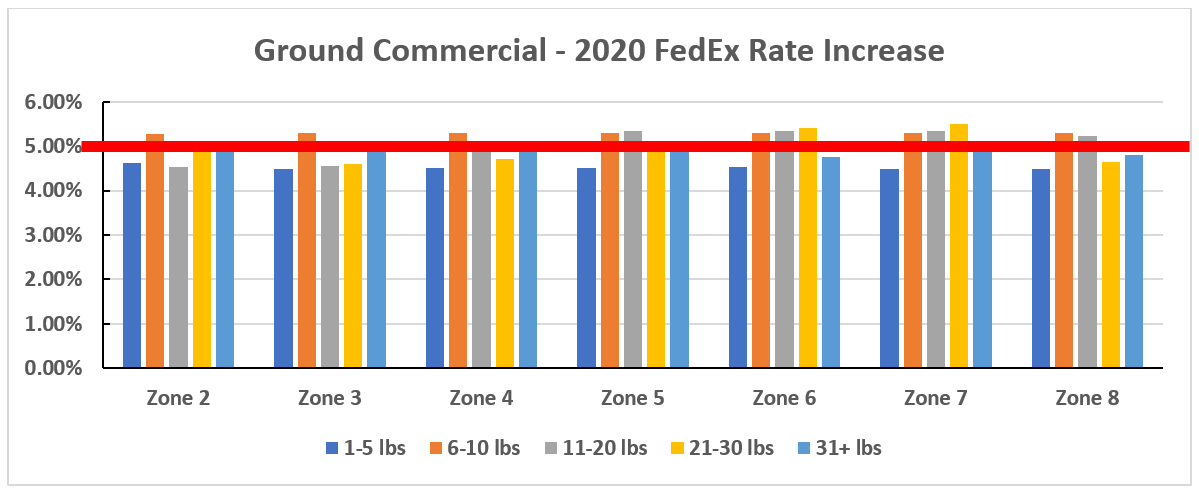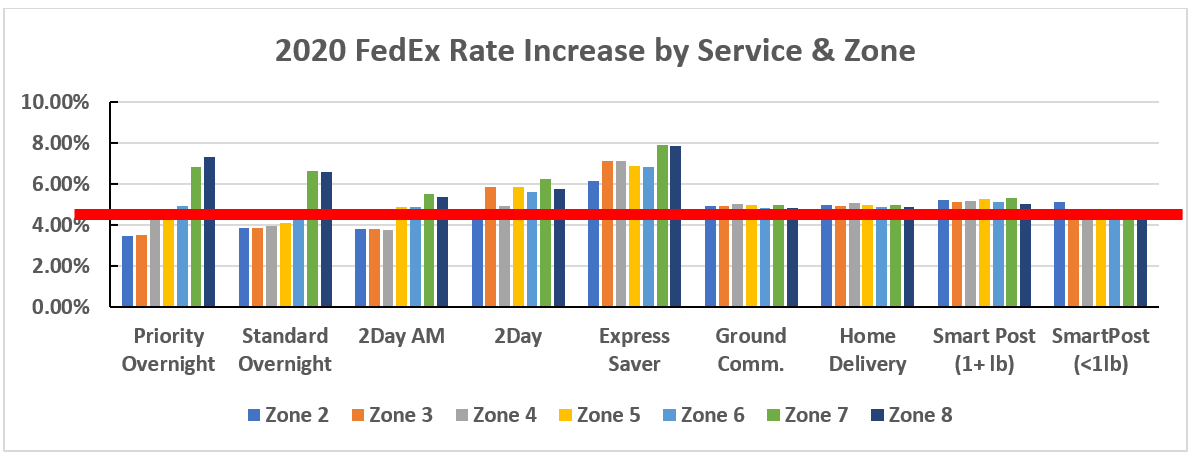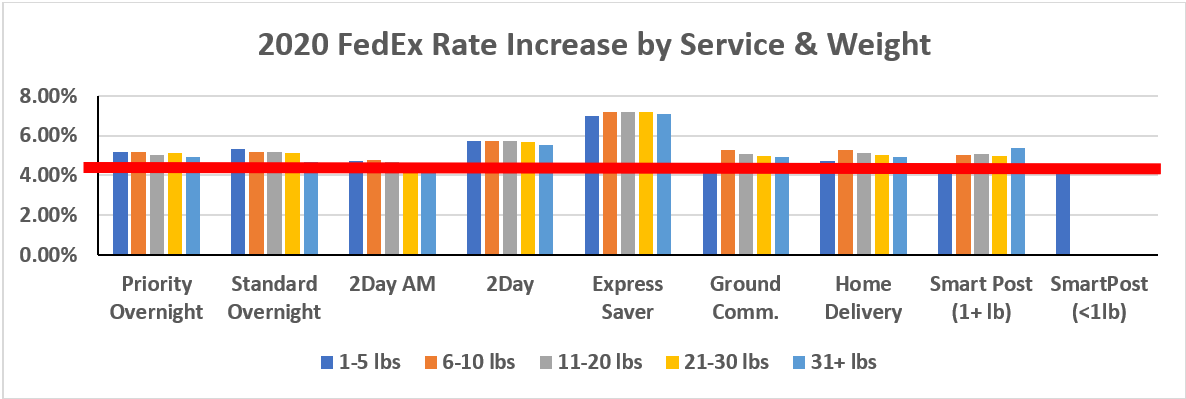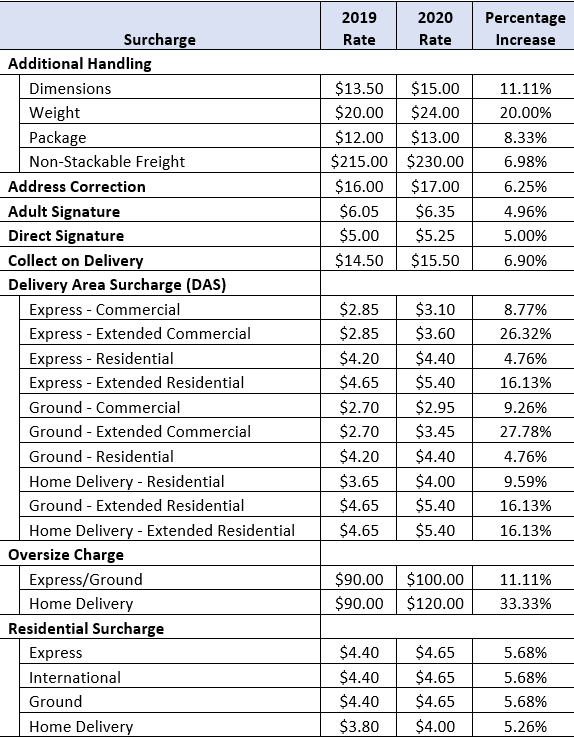On September 16, 2019, FedEx announced their annual general rate increase for 2020. Effective January 6, 2020, FedEx Express (Domestic, US Export, and US Import), FedEx Ground, and FedEx Home Delivery shipping rates will increase by an average of 4.9%, while FedEx Freight will increase rates by an average of 5.9%.
How Will This Affect Individual Shippers?
There is often a discrepancy between the announced general rate increase and the effect that the increase has on individual shippers. If you’re a shipper that routinely ships large packages, long-zone express, three-day express, or ships to remote areas, it is likely that you will be subject to an increase much larger than the stated 4.9%.
A detailed analysis will be available soon next week, but in the interim, here are some areas which will likely have the most impact:
FedEx continues its emphasis on penalizing large packages in its networks. Notably, Additional Handling – Dimensions and Weight and Oversize will see large increases.
- Additional Handling – Dimensions will increase by 11.1% to $15
- Additional Handling – Weight will increase by 20% to $24
- Oversize packages have now been broken out by service type. Express and Commercial Ground packages will increase by 11.1% to $100, but Home Delivery will increase by 33.3% to $120
FedEx has placed a new emphasis on “Extended” Delivery Area Surcharges (DAS). ZIP Codes designated as extended delivery area will incur a much larger increase than their non-extended DAS counterparts. Refer to the full table below for the full breakdown of the increases.
- Standard DAS increases range from 4.7% - 9.6%
- Extended DAS increases range from 16.1% - 27.8%
- Note that DAS/Extended DAS zip codes have changed. Refer to the changes here: https://www.fedex.com/content/dam/fedex/us-united-states/services/DAS_Zip_Code_Changes.pdf
The ground minimum package charge (Zone 2, 1-pound list rate) has increased by 4.84% to $8.23. Commercial ground increases are similar across weights and zones:

Longer zones have larger increases than shorter zones for express services. This will generally affect shippers with one distribution center more significantly. This discrepancy can be seen on the chart below:

Three-day shipping has a larger increase than other services. Three-day is often distributed on the same Two-Day/Express network and is likely close for FedEx in cost-to-serve, but with lower revenue for FedEx. Note the increases as displayed by weight vs. the other services (increases across weights are similar):

The following table shows the average increases by domestic service and the associated minimum charge increases:

This table shows assessorial increases for FedEx’s most commonly assessed charges:

Effective January 20, 2020, new surcharge ratings will occur. Some are likely to be impactful for many shippers and further emphasize FedEx’s stance on large packages. Here are the highlights:
- Additional Handling – Weight will now apply for domestic express and ground for packages with an actual weight greater than 50 pounds (down from 70 pounds). 70 pounds is still the threshold for international export and international ground.
- Additional Handling – Dimension, Packaging, and Weight will now apply to US imports (greater than 70 pound actual weight is the threshold for imports/weight).
- Additional Handling – Freight will now apply to express shipments with a handling unit measuring greater than 62 inches along its longest side (previously 70 inches).
- Oversize will now apply to express US international shipments but will not have a 90-pound minimum billable weight (domestic and international ground are still subject to the 90-pound minimum billable weight).
- Fuel surcharges will now apply to Additional Handling surcharges (including peak for 2020), Collect on Delivery, and Signatures (full details here:https://www.fedex.com/en-us/shipping/fuel-surcharge.html)
FedEx has also announced that they will not assess additional fees for residentials shipped during the holidays but will continue to assess additional fees for additional handling ($4.10), oversize ($37.50), and unauthorized packages ($435).
As is the case with each annual rate increase, it is vital to understand how all changes combined will impact your individual characteristics and, ultimately, your overall shipping costs. And there is no better time to start than now; don’t wait for the changes to go into effect.
Matt Bohn is a Senior Consultant, Professional Services at Shipware, LLC, where he works to optimize carrier contracts for high-volume shippers. Matt has nine years of previous experience as a Revenue Management Advisor at FedEx, where he analyzed and developed contracts for some of FedEx’s largest e-commerce shippers. Matt has transitioned to helping similar shippers dramatically reduce their shipping costs. He can be reached at mbohn@shipware.com.


















